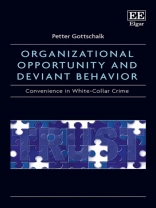Ever since Sutherland coined the term ‘white-collar crime’, researchers have struggled to understand and explain why some individuals abuse their privileged positions of trust and commit financial crime. This book makes a novel contribution to the development of convenience theory as a framework to understand and explain ‘white-collar crime’. The framework integrates well-known theories from criminology, management and other fields to explain the occurrence of offenses. It is found that autobiographies indicate a strong presence of neutralization techniques in the behavioral dimension of convenience theory, while internal investigations indicate a strong presence of organizational opportunities to commit ‘white-collar crime’. Survey research, on the other hand, is found to indicate a strong belief that chief executives sometimes have the motive to commit financial crime in times of crisis, in times of great challenges, and in times of greed. The book concludes that the only feasible avenue to combat this type of crime is to make it less convenient. This book will appeal to criminology and criminal justice students at both bachelor and master levels, as well as those studying business and law. Practitioners, including consultants in global auditing firms, attorneys and police academy students will also benefit from the overview of convenience theory research.
Petter Gottschalk
Organizational Opportunity and Deviant Behavior [PDF ebook]
Convenience in White-Collar Crime
Organizational Opportunity and Deviant Behavior [PDF ebook]
Convenience in White-Collar Crime
Beli ebook ini dan dapatkan 1 lagi GRATIS!
Bahasa Inggris ● Format PDF ● ISBN 9781788111881 ● Penerbit Edward Elgar Publishing ● Diterbitkan 2017 ● Diunduh 3 kali ● Mata uang EUR ● ID 8288006 ● Perlindungan salinan Adobe DRM
Membutuhkan pembaca ebook yang mampu DRM












